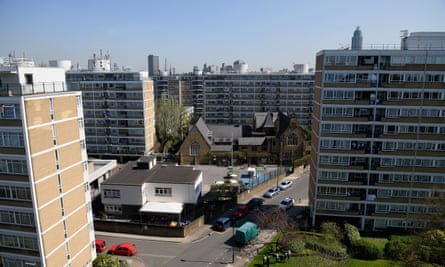“You have got to be kidding me,” says Louis Margeite. “If that’s the average salary, some people must be earning millions, because no one we know earns anything remotely close to that.”
The 52-year-old postal worker has just learned he lives in the parliamentary seat with the highest average salary: the Cities of London and Westminster, where the mean average for full-time workers is almost £80,000, according to HMRC statistics, and rising fast.
Margeite has lived in the constituency all his life. Not in the white stucco mansions of Belgravia and Mayfair, but in Churchill Gardens, one of the country’s largest council estates. “Everyone assumes people who live in Westminster are fantastically wealthy, and don’t get me wrong, a lot of them are,” he says. “But there are a lot of us who are struggling – even those of us who are in what would have been considered good jobs.”
Such inequality is symptomatic of a national trend. The pay of the top 1% of earners across the UK – those already on more than £170,000 a year – is rising at an average annualised rate of 9.1%, according to an analysis of Office for National Statistics data.
.
At the same time, those in the lowest 10% – those earning below £8,000 a year – have seen their pay rise by just 1.3%. That’s far below the rate of inflation, currently at a 40-year high of 9.4% and forecast by the Bank of England to hit 13% in the coming months. The latest tranche of pay data from the ONS, due to be released on Tuesday, is expected to show even greater increases at the top and anaemic growth at the bottom.
HMRC payslip data shows the mean average salary in the Cities of London and Westminster is £79,693. Elsewhere in London, it is more than £75,000 in Poplar and Limehouse, and £55,500 in Islington South and Finsbury, versus a UK average of £38,186. At the bottom end, it falls below £25,000 in South East Cornwall and Dwyfor Meirionnydd in Wales.
Margeite is right; many people living in the Pimlico streets that surround Churchill Gardens are likely to earn more than £1m a year. Government data does not identify where the 1% of top earners live, but the constituency’s median average pay of £52,000 indicates that extremely high earners are skewing the data.
 View image in fullscreenChurchill Gardens is one of Britain’s largest council estates. Photograph: Jeff J Mitchell/Getty Images
View image in fullscreenChurchill Gardens is one of Britain’s largest council estates. Photograph: Jeff J Mitchell/Getty Images
Margeite, who is walking his dog, Lorraine, after finishing his postal round on a blistering sunny day, worries that children on the 1,600-home estate have “got no chance of ever catching up with those who live just feet away”.
The 32-block complex, which replaced rows of Victorian terraces destroyed during the blitz, occupies an enviable position in a bend on the Thames between Tate Britain and the Royal Hospital grounds that host the Chelsea flower show. Even small two-bedroom flats across the street from the estate have sold for more than £1m, and a seven-bedroom terrace a block away is on the market for £10m.
“The gap is just getting wider and wider, as the rich get richer and richer,” Margeite says. “And we essential workers get no pay rises, or rises that are far lower than inflation.”
He has noticed on his postal round in nearby Chelsea that he is delivering more luxury goods than ever before. “All of the top names – Chanel, Prada, Gucci – their sales keep rising. This is meant to be a cost of living crisis going on, but they wouldn’t know,” he says gesturing at the nearby mansions.
In the youth club in the centre of the estate, Zahide Sidi is also concerned about what he calls “the shame of secret poverty”.
 View image in fullscreenZahide Sidi says many of the boys at his youth club come from homes where parents have turned off boilers due to soaring energy prices. Photograph: Sean Smith/The Guardian
View image in fullscreenZahide Sidi says many of the boys at his youth club come from homes where parents have turned off boilers due to soaring energy prices. Photograph: Sean Smith/The Guardian
The youth worker, who turned 25 this week and has also lived on Churchill Gardens his whole life, says it appears nicer than many other estates in London because people try hard to keep up appearances. “But peer inside and you’ll see that many people are really struggling.”
skip past newsletter promotion
Sign up to First Edition
Free daily newsletter
Our morning email breaks down the key stories of the day, telling you what’s happening and why it matters
Enter your email address Enter your email address Sign upPrivacy Notice: Newsletters may contain info about charities, online ads, and content funded by outside parties. For more information see our Privacy Policy. We use Google reCaptcha to protect our website and the Google Privacy Policy and Terms of Service apply.
after newsletter promotion
Sidi, who works for the charity Future Men, which supports young males away from drugs and towards brighter futures, says many of the boys at the youth club are unable to wash because their parents have turned off their boilers to save money on gas.
“We are having to stock the youth club with deodorant and body wash, because they are not able to shower at home. Their parents have been left picking between hot water and feeding their kids.”
He says one boy arrived on a hot August day dressed in four T-shirts and three pairs of trousers to mask his body odour. Sidi, who earns about £1,200 a month, is struggling himself and still living with his parents. “Everything is more expensive, but I’m not getting paid any more. I have to decide whether I can have a meal out with my missus or buy some new clothes – I can’t do both.”
Frances O’Grady, the general secretary of the Trades Union Congress, says such stories are familiar up and down the country. “Working people are at breaking point, having been left at the mercy of soaring bills after a decade of standstill wages and universal credit cuts. But for the wealthiest, it’s business as usual.
“It’s not just pay at the top that is soaring. Bonuses in the City are at a record high and dividend payouts to shareholders are booming. Without urgent action, the cost of living crisis will deepen the class divide in this country even further.”
Rachel Kay, head of research at the High Pay Centre, a thinktank that campaigns against excessive executive pay, says the government must urgently act to tackle the yawning economic inequality gap.
“Pay increases for those at the very top are vastly outstripping increases for those at the bottom, leaving low earners facing crippling real-terms pay cuts,” she says. “This will lead to more widespread poverty and financial hardship, which in turn will limit demand in the economy and increase the risk of a recession.
“This is not just a matter of tackling low pay; excessive pay at the top is itself a driver of inflation, and is the outcome of an economic system that concentrates wealth amongst a small number of people.”



Leave a Reply
You must be logged in to post a comment.